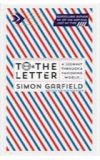
29 Oct 2013 04:42:14
As Simon Garfield says in his chatty history of what he calls "epistolarity", no such emotional drama attaches to electronic communications. Tweets are telegraphic, and have no individual recipient in mind; texts are usually as blunt and clumsy as the thumbs that punch them out; even emails are "a poke, whereas letters are a caress". But such is the lingering appeal of the outmoded medium of the letter that the icons on our screens are postal metaphors: a symbolic pillar box, paperclips for attachments, a bin for deletions.
The poets in Garfield's book remain unregenerate paper fetishists. Christopher Reid, who edited Ted Hughes's letters, asked Hughes's correspondents to send in photocopies; some incautiously posted off the originals, which Reid describes as "very frail and vulnerable". His phrase makes it sound as if he had custody of the elderly Hughes, not those wrinkled, fading pages – appropriately so, since a letter is the product of the writer's body, a hand extended across an estranging distance. Hughes understood the privileged intimacy of the form, which is why he called his poems about his marriage to Sylvia Plath Birthday Letters. He told Seamus Heaney that he thought of the letters as "an illegal private transaction between her and me". Illegal? Did he mean "illicit"? If so, the slip is Freudian: he wanted the rest of us to feel, when reading, that we had broken the law by tampering with someone else's emotional property.
Garfield's book dodges between sociology, political history and literary criticism, and is over-extended by anecdotal detours about the cost of paper, the trade in manuscripts, and his current home in a former post office garage. Some of the trivia, I admit, is fascinating: along with SWALK, Garfield disinters other examples of the acronyms used on envelopes by randy soldiers, including NORWICH, which stood for Nickers Off Ready When I Come Home, and EGYPT, which semaphored Eager to Grab Your Pretty Tits. Sexual hunger, in those less permissive days, was the mother of invention.
Perhaps the motive for Garfield's all-inclusiveness is panic: he wants to transcribe all this before a post-literate world forgets what letters are, just as teenagers now gape in bemusement at telephones with rotary dials. He need not have feared. The internet may have deterred us from using snail mail, but it has helped to preserve and circulate what Shaun Usher calls "letters of note". In his beautifully designed anthology, Usher – "sole custodian" of a blog that goes by the same name – offers further of the internet's boons: his book is published in partnership with Unbound, which has revived the practice of patronage "for the digital age" by recruiting subscribers online.
Garfield's history concludes by quoting a slangy wartime letter to a friend by the Queen Mother, who ends by saying "Tinkety tonky old fruit" and then inexplicably signs herself "Peter"; Usher's compilation begins with a facsimile of a letter written by the current Queen to President Eisenhower, enclosing her recipe for drop scones and recommending that "the mixture needs a great deal of beating". It's a solemn and stodgy communiqué, and when the Queen refers to "us" it's not clear that she doesn't merely mean her royally plural self. She addresses Ike as "Mr President" and signs off as "Elizabeth R". Given this officiousness, I'm not convinced that she beat the batter personally.
Letters to presidents constitute a minor genre in Usher's collection. Elsewhere, a GI whose nerve failed under fire appeals to Eisenhower to save him from the firing squad; he received no reply, and the execution went ahead. The adolescent Fidel Castro also got no answer when he wrote in pencil to "my good friend Roosvelt" (yes, misspelled) in 1940, cheekily asking for "a ten dollars bill green american". FDR did reply, at eloquent length, to Alletta Sullivan, who wanted to know whether it was true that her five sons had been killed together by a Japanese torpedo at Guadalcanal in 1942. The president's grave and touching confirmation is a reminder of what a head of state should ideally be – the parent of a national family, not a business-suited CEO or a sovereign commuting between palaces.
The most extraordinary letters Usher reproduces are about impending death: Virginia Woolf's suicide note, a narrative of Aldous Huxley's last agonised days by his widow, a telegram from the sinking Titanic, and many others. In a recriminatory harangue after her break-up with HG Wells, Rebecca West protests that she will not "be cheated out of my deathbed scene". Here we have the letter at its rawest and most urgent: the last will and testament of a live, dying individual, who – like the kamikaze pilot who composes a note to his children before departing on his final mission – might be writing from the grave. Garfield suggests that his study of the form is "a book about kindness". Amused and amazed as I was by Usher's other choices, I kept returning to these small tragedies and the records they left behind. Letters of Note, I think, is a book about sadness.

